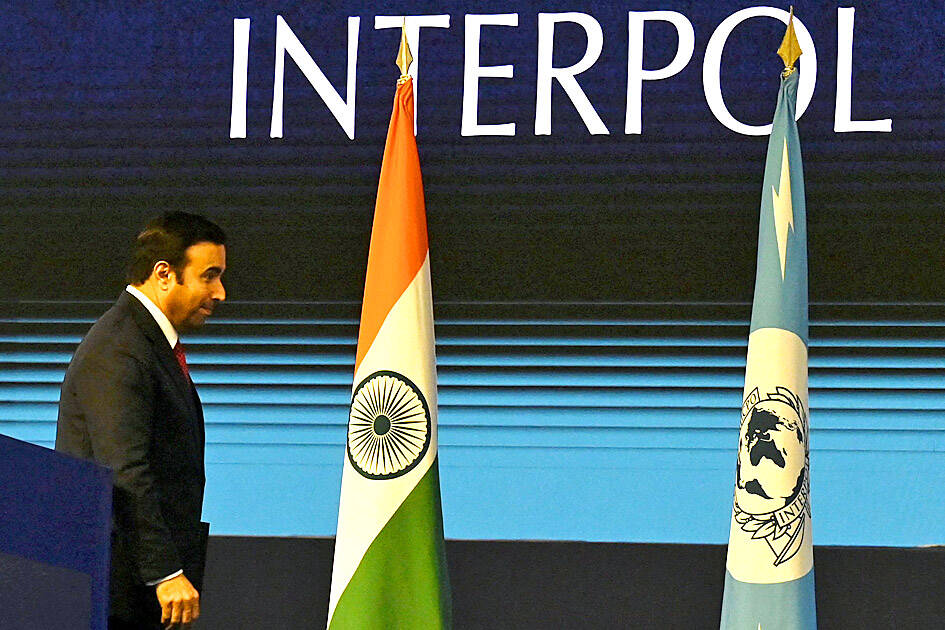The Ministry of Foreign Affairs expressed “serious dissatisfaction” that Taiwan was not invited to the annual International Criminal Police Organization (Interpol) General Assembly, which opened in New Delhi yesterday.
“We find it deeply regrettable that Interpol has allowed political factors to override policing expertise by disregarding Taiwan’s practical needs to meaningfully participate in the organization’s meetings,” ministry spokeswoman Joanne Ou (歐江安) told a news briefing.
The Republic of China (ROC) is a sovereign, independent democratic state and is not subordinate to the autocratic People’s Republic of China (PRC), Ou said, using Taiwan’s official name.

Photo: AFP
Only the democratically elected government of Taiwan has the right to represent Taiwanese on the international stage, she said.
Interpol Secretary-General Jurgen Stock on Monday said that Interpol cannot grant observer status to Taiwan because it sees Taiwan as part of the PRC.
“In 1984, the Interpol General Assembly recognized the People’s Republic of China as the sole representation of China,” Stock told a press event.
“As such, Interpol recognizes Taiwan is part of China, and as China is a member of Interpol, Interpol cannot grant Taiwan observer status in the general assembly,” he said.
“Arrangements were put in place” after 1984 to enable Interpol National Central Bureaus and the “China-Taiwan police administration” to exchange information through “Interpol channels,” he said, without elaborating.
Ou yesterday said that Taiwan’s police system has always operated independently and smoothly outside that of the PRC.
“As an important member of the international police community, Taiwan is highly willing to contribute to cross-border crime fighting, but cannot establish direct and real-time information sharing with Interpol simply due to China’s obstruction,” she said.
Taiwan would continue to ask its diplomatic allies and like-minded countries to support its bid to join Interpol, to ensure that no gaps exist in the global fight against cross-border crime, Ou said.
The 90th Interpol General Assembly is taking place in New Delhi until Friday, featuring chiefs of police and senior officials from its 195 members around the world to address global security issues.
The ROC joined Interpol in 1961, but was forced to withdraw in 1984 after the entry of the PRC. Its participation was blocked under a resolution passed at the 53rd Interpol General Assembly the same year.
Taiwan has sought to take part in the general assembly as an observer since 2016, but repeated attempts to secure an invitation have failed.

Taiwan has received more than US$70 million in royalties as of the end of last year from developing the F-16V jet as countries worldwide purchase or upgrade to this popular model, government and military officials said on Saturday. Taiwan funded the development of the F-16V jet and ended up the sole investor as other countries withdrew from the program. Now the F-16V is increasingly popular and countries must pay Taiwan a percentage in royalties when they purchase new F-16V aircraft or upgrade older F-16 models. The next five years are expected to be the peak for these royalties, with Taiwan potentially earning

STAY IN YOUR LANE: As the US and Israel attack Iran, the ministry has warned China not to overstep by including Taiwanese citizens in its evacuation orders The Ministry of Foreign Affairs (MOFA) yesterday rebuked a statement by China’s embassy in Israel that it would evacuate Taiwanese holders of Chinese travel documents from Israel amid the latter’s escalating conflict with Iran. Tensions have risen across the Middle East in the wake of US and Israeli airstrikes on Iran beginning Saturday. China subsequently issued an evacuation notice for its citizens. In a news release, the Chinese embassy in Israel said holders of “Taiwan compatriot permits (台胞證)” issued to Taiwanese nationals by Chinese authorities for travel to China — could register for evacuation to Egypt. In Taipei, the ministry yesterday said Taiwan

‘LIKE-MINDED PARTNER’: Tako van Popta said it would be inappropriate to delay signing the deal with Taiwan because of China, adding he would promote the issue Canadian senators have stressed Taiwan’s importance for international trade and expressed enthusiasm for ensuring the Taiwan-Canada trade cooperation framework agreement is implemented this year. Representative to Canada Harry Tseng (曾厚仁) in an interview with the Central News Agency (CNA) said he was increasingly uneasy about Ottawa’s delays in signing the agreement, especially as Ottawa has warmed toward Beijing. There are “no negotiations left. Not only [is it] initialed, we have three versions of the text ready: English, French and Mandarin,” Tseng said. “That tells you how close we are to the final signature.” Tseng said that he hoped Canadian Prime Minister Mark Carney

POSITIVE DEVELOPMENT: Japan and the US are expected to hold in-depth discussions on Taiwan-related issues during the meeting next month, Japanese sources said The holding of a Japan-US leaders’ meeting ahead of US President Donald Trump’s visit to China is positive news for Taiwan, former Japan-Taiwan Exchange Association representative Hiroyasu Izumi said yesterday. After the Liberal Democratic Party’s landslide victory in Japan’s House of Representatives election, Japanese Prime Minister Sanae Takaichi is scheduled to visit the US next month, where she is to meet with Trump ahead of the US president’s planned visit to China from March 31 to April 2 for a meeting with Chinese President Xi Jinping (習近平). Japan and the US are expected to hold in-depth discussions on Taiwan-related issues during the